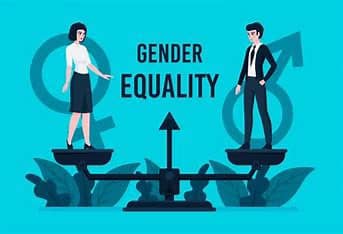The phrase “gender equality” is thrown around a lot these days, often by self-proclaimed modern thinkers. But if you dig a little deeper, what does it actually mean? It seems everyone has their own interpretation, often with a fuzzy logic that doesn’t quite hold up.
We often hear “women should get equal opportunities with men,” but even that can be hard to define. Consider some common examples:
- “Ladies First”: If we truly believe in equality, why prioritize one gender over the other?
- Women’s Reservation: Doesn’t reserving spots for one group contradict the idea of equal opportunity for all?
Let’s play devil’s advocate for a moment. If gender equality means no discrimination, should men and women share the same restrooms? (My apologies for the provocative image, but it highlights the absurdity when we take “equality in every space” literally.)
Why Men and Women Can’t Be “Equal” in Every Sense
Here’s my take, and I believe many of you will agree. Men and women simply can’t be equal in every single aspect. Why? Nature made us different.
Physically, men are generally stronger and larger. Women, on the other hand, possess the incredible ability to give birth. There are things men can do that women can’t, and vice-versa. And then there are areas where we perform equally well.
So, where does that leave us? Are men superior in some ways and women in others? Yes, absolutely. And in some areas, we’re on par.
This leads me to a term I find more fitting: complementary. Men and women are designed to complement each other. Neither can truly thrive or ensure the survival of humanity without the other. Our differences, far from being a disadvantage, are what make us whole.
Redefining True Gender Equality
Despite our natural differences, I firmly believe in gender equality. But my definition might surprise you.
A friend once challenged me, asking why, if I supported gender equality, I wasn’t advocating for men and women to compete in the same sporting events, or share toilets, for that matter. It’s an interesting point. Why do we have separate “Ladies’ Tennis” and “Men’s Tennis,” or distinct sprint events?
My argument is this: gender equality doesn’t mean equal opportunity in every single space. If it did, then reservations and separate events would indeed defeat the purpose.
For me, true gender equality boils down to equal respect and equal remuneration for the same level of performance within their exclusive domains. This isn’t just about physical capabilities, like in sports; it applies to all professions and contributions where distinct roles or aptitudes exist.
Think about it: Serena Williams might lose a match against Novak Djokovic because of physical differences. Where’s the equality there? The equality comes when both Serena and Novak are recognized and rewarded as champions in their respective fields (Serena in women’s singles, Novak in men’s singles). Why should men’s championships command more sponsorship or pay higher prizes than women’s?
Why do male cricketers get paid more, receive more appreciation, and garner more respect than their female counterparts? Why is Sachin Tendulkar revered as a “God of Cricket” while Mithali Raj, an equally formidable player, is simply a “good Indian woman cricketer”? The same applies to hockey players – why the disparity in pay and respect?
The Path Forward: Respect and Remuneration
Nature has indeed made men and women differently. We complement each other, but we cannot be physically identical or compete in every domain. However, we can achieve true gender equality by extending the same respect, offering the same pay scales, and granting the same status to champions of both genders within their own spheres.
Why “Ladies First”? Perhaps it’s a mark of respect, acknowledging that despite physical differences, women are stepping into public and professional roles where they’ve historically been disadvantaged. Why women’s reservation? It can be seen as an affirmative step to uplift women’s status after historical periods of disproportionate power and opportunity, which often resulted in a lack of respect and recognition.
Ultimately, gender equality is achieved when respect and remuneration are truly equal. In offices, while salaries might be at par for the same post (though often they’re not), women frequently don’t receive the same respect as men. In fact, many still face harassment and abuse. That’s why equal respect must go hand-in-hand with equal pay.
So, how do we begin? It starts at home. Personally, I hold Sachin Tendulkar and Mithali Raj in equal regard. I watch women’s cricket with the same enthusiasm as men’s. Are you ready to do the same? If so, you’re actively contributing to gender equality. If not, we risk heading down a path where neither respect nor equality truly exists.

